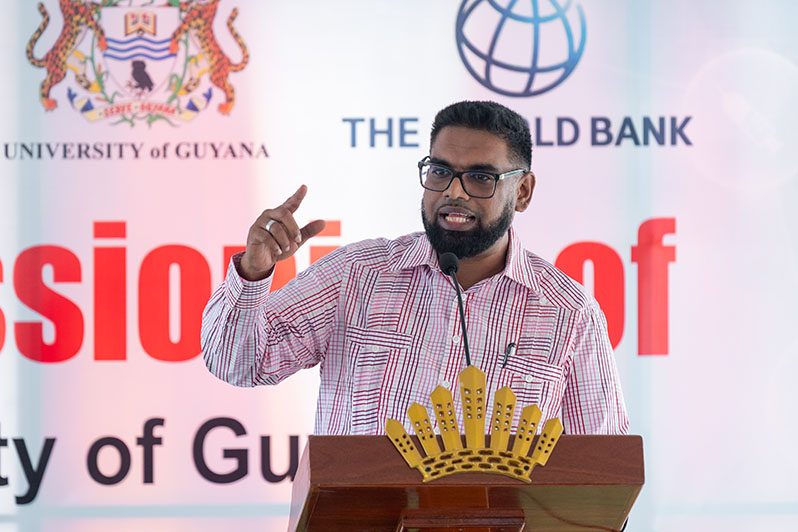–President Ali says, affirms there is no cutting costs or concerns to deliver free education
–as new US$4.5M College of Medical Science building unveiled at UG
By Naomi Parris
IN pursuit of the highest standards of education, the Government of Guyana is making continuous investments to integrate sectors, build out infrastructure and strengthen collaborations, President, Dr. Irfaan Ali has said.
“Many times when you graduate to free university education, most times the capital investment comes down…we are giving free education, at the maximum standard, we’re going to invest in the highest standards, the maximum standard, so we’re not cutting costs or cutting corners to deliver that free education,” President Ali told a gathering at the commissioning ceremony for the new US$4.5 million College of Medical Sciences building at the University of Guyana’s (UG)’s Turkeyen Campus.
The Head of State said that the government’s vision is not one that is centralised, but one that will see the deployment of services such as education and healthcare to every single region across the country.
To this end, the President pointed to projects that are already in the pipelines, including plans to convert the New Amsterdam Hospital into a teaching facility with the capacity to facilitate 200 students; expand the school of nursing and engage partners like Mount Sinai to collaborate on research and education platforms to offer specialised programmes to Guyanese.
“This is what an integrated education and world-class education and healthcare system must look like, and we’re making those investments out…,” President Ali said.
The government, he related, has already begun outlining its health programme for the next five years, focusing on significant, stimulated investments for students.
“We know the world is advancing at a tremendous pace, and we will also have to have labs that allow our students to learn robotics, AI, using robotic arms to do surgery, otherwise you will not be able to function in the new healthcare system that the world is adopting,” the Head of State said.
This, he said, will be an important priority as the government now looks to partner with incubators at Silicon Valley.
“That is where the world is going, and that is the space in which we want to operate. That is a space in which we want to apply our development strategy innovation… AI, digitisation, all must be integrated into every single thing we’re doing here at the university and in our national development plans and programmes,” Dr. Ali said.
He added: “We want to prepare and produce students who are world class in every field,” noting that a similar formula is being applied to other areas of education, such as engineering.
The new facility at UG was funded by the World Bank. The new building, fully furnished and equipped with multimedia projectors, will enable the university to accommodate 40 per cent more students in its medical programmes.
“So, this single structure brings together, in perfect synergy, all the hopes, dreams and aspirations of thousands across time, space and discipline,” UG’s Vice-Chancellor, Professor Paloma Mohamed-Martin said.
The Vice Chancellor noted that medical students across the country will see at least $6 million being invested into them, with the government’s recent move to make tertiary education free.
“So, there is a double gift this afternoon. Not only do you have a beautiful, well equipped, modern building, but you also have the opportunity of coming to a university in which the state is going to fund you,” she said.
Discussions to build the new facility first began in 2013, when the university approach the World Bank to assist in building its capacity to take in medical students.
However, due to several delays, the project was stalled. It was only just two years ago; the sod was finally turned for the new building.
“It is the culmination of hard work and visionary leadership. Indeed, even as we commission this building today, it has been a long focus and committed journey,” Dr, Emanuel Cummings the Deputy Vice Chancellor of Academic Engagement shared.
Dr. Cummings noted that it took almost a decade of lobbying for support and discussions to see fruition of the new building.
He also recalled that the Medical School had lost its accreditation because the Caribbean Accreditation Authority for Education in Medicine and Other Health Professions (CAAM–HP) cited the need for a major review of the curriculum of the Bachelor of Medicine, Bachelor of Surgery (MBBS) programme, inadequate classrooms and laboratories. These were reviewed and the programme is now accredited for four years.



.jpg)










